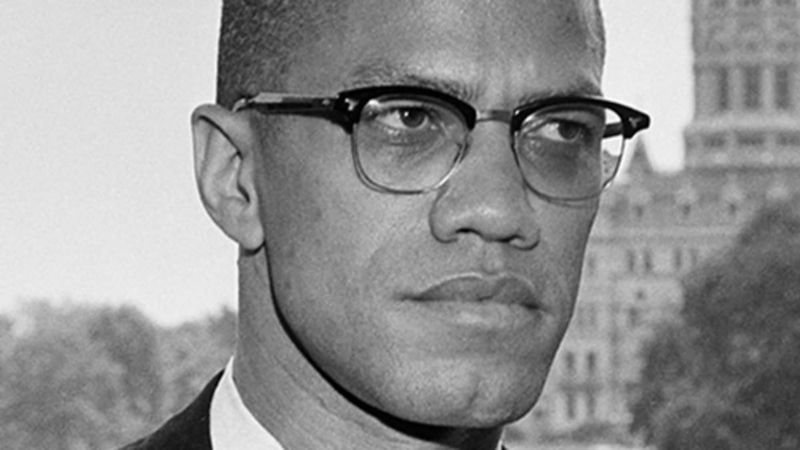A Critic's Meta Review: 4/5
Malcolm X (REVIEW)
I remember once, when I was visiting my (recently deceased) grandfather in Wichita, KS, we (my grandfather, myself, my mother, and my younger sister) stopped by a bookstore where they had a whole section of books that were being sold at an attractively discounted rate. I am talking less than fifteen cents for a book. Now, as my grandfather was never one to pass up a good bargain, we decided to check it out. Having a few dimes of my own to drop (from where I am not sure, but I definitely had a bit of change in my gym short pockets), I branched off from the rest of the crew in order to carefully inspect the section, perusing anything that happened to pique my interest and plopping it into my Star Wars book bag (I was big on the prequels at the time...now, I could care less if they ever make another one of those silly vehicles for consumerism).
One of the books that captured my attention was a biography of Malcolm X (not the famous autobiography written in collaboration with Alex Haley - just a standard, short biography on the man’s life). I was drawn to this book mostly because on the back flap it described Malcolm X as a martyr for the civil rights movement and, having recently learned about Dr. King and Sister Rosa (not to be confused with Surfer Rosa), I was curious to learn of this mysterious “X” fella.
However, when my grandfather saw me flipping through the book, he advised me to consider another selection. He claimed that Brother Malcolm was an extremist and suggested I shift my focus towards more “noble” figures like Nelson Mandela (never mind the fact that Nelson Mandela was sent to prison for nearly three decades as a result of leading an armed revolt against the apartheid government of South Africa; also, quite ironically, Nelson Mandela makes an appearance at the end of this film - giving an impassioned speech in support of Malcolm X’s legacy).
My grandfather was not alone in sharing this sentiment. Many Americans - even many black Americans, including a fair amount of Malcolm’s civil rights contemporaries - viewed him as an aggressive instigator and, ultimately, detrimental to the overall struggle for freedom and justice. Indeed, as we see in the movie, even his mentor (and, later, betrayer) Elijah Muhammad grew disillusioned with his inflammatory rhetoric.
But, much like John Shaft, Brother Malcom was a very complicated man and no one truly understood him but his woman - and Spike Lee (whose films I have really been enjoying as of late; if you have not seen Mo’ Better Blues, I highly recommend it, especially if you are a fan of Denzel), who did a phenomenal job of telling this extremely layered story with just the right amount of nuance to eliminate the possibility of making any (no pun intended) black and white judgments about the man.
It is not like he was pressed for time in doing so, though, as this movie is over three hours long. Now, usually, when I see a runtime like that next to something that does not have the words “based on the famous novel by J.R.R. Tolkien” somewhere in the description, I tend to shy away. Long movies are an investment, and I typically prefer not to spend too much time with my eyes glued to the idiot box.
This was an exception, though. This was a story that I felt like I needed to make myself aware of, which is why I dedicated two sittings towards watching it (spreading it out was definitely the right move). Perhaps it was because I never got to read that biography when I was a kid. Perhaps it was because I felt as if Brother Malcolm’s story had been overshadowed by the (equally powerful, but in a significantly different way) story of Brother Martin. Perhaps I have simply just reached a point where I no longer believe that the fight for justice and equality of all people can be achieved by holding hands and singing kumbaya.
Eh, who am I kidding? I still think, with enough drums, we could get a circle going that gets us all grooving. Wouldn’t that be something? One nation, under a groove - getting down for the funk of it. In this respect, I would echo the sentiments of post-Mecca Malcolm in that we will only ever achieve true liberation from the shackles of suffering when we rid ourselves of all forms of hatred and unify against the common enemy of injustice, allying with any human being who is committed to this cause, regardless of the color of their skin. A group of people who have aligned themselves together based solely on the color of their skin, no matter what color it may be, is a prime example of what Kurt Vonnegut termed a “granfalloon” in Cat’s Cradle.
By the time Malcolm had returned from his pilgrimage, it seemed as if he had had enough of Elijah and the Nation’s foma. He was only interested, at that point, in banding together with the members of his karass...which is why he got got.
So it goes.

